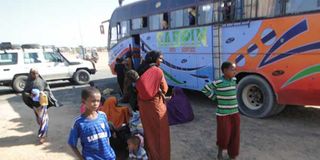We are tired of camp life, Somali refugees say as 237 more leave Dadaab

Some of the Somali refugees who voluntarily opted to return to Somalia prepare to board buses at the Dadaab airstrip on June 14, 2016. Sources said the latest group comprised of 237 refugees, most of them women and children. PHOTO | ABDIMALIK HAJIR | NATION MEDIA GROUP
What you need to know:
- That agreement expires in September 2016, but only 5,200 of refugees from a possible 400,000 have left Dadaab.
- On Tuesday, there was evident apprehension, anxiety and confusion as the latest group of refugees left for Somalia.
- The returnees said they are tired of refugee life and would want to start their own life back home.
- The Kenyan government has been insisting that the Dadaab camp will be closed.
A group of Somali refugees Tuesday left the Dadaab refugee camp for Somalia under the voluntary repatriation programme, saying they were ready to start a new life back in their home country.
This follows an earlier tripartite agreement between Kenya, Somalia and the United Nation High Commission for Refugees (UNHCR).
The agreement, signed three years ago, sought to have refugees voluntarily go back home.
That agreement expires in September 2016, but only 5,200 of refugees from a possible 400,000 living in Dadaab have been repatriated through the programme.
On Tuesday, there was evident apprehension, anxiety and confusion at the Dadaab airstrip as the latest group of refugees left for Somalia.

Buses carrying refugees, who voluntarily opted to return to Somalia, leave the Dadaab airstrip on June 14, 2016. PHOTO | ABDIMALIK HAJIR | NATION MEDIA GROUP
TIRED OF REFUGEE LIFE
Speaking to the Nation at the airstrip the returnees said they are tired of refugee life and would want to start their own life back home.
Some, however, said they were not certain whether the situation in Somalia had improved.
Asha Hussein, 34, who has been living in Efo 2 for the last six years, said she and her husband decided to go back to Somalia since they have been told that security in Somalia had improved.
“We also have cattle there [so] we decided to go back to continue with our normal life although we are not so sure whether it is true security has really improved. Refugee life is also not good,” the mother of two told the Nation before she boarded one of the UN-hired buses.

A woman and her children board a bus at the Dadaab airstrip on June 14, 2016 as 237 Somali refugees returned home under the voluntary repatriation programme. PHOTO | ABDIMALIK HAJIR | NATION MEDIA GROUP
WOMEN AND CHILDREN
A source that did not want to be named because they are not allowed to speak to the media on behalf of the government said the latest group in the voluntary repatriation comprised 237 refugees, majority of them women and children.
The Kenyan government has been insisting that the Dadaab camp will be closed saying it has been acting as a hideout for Al-Shabaab militants who have been launching terror attacks in various parts of the country.
In his recent visit to Garissa, President Uhuru Kenyatta said Kenyans have been generous in hosting refugees for more than 23 years and it was time for the Somali government and its people to help them return home.





